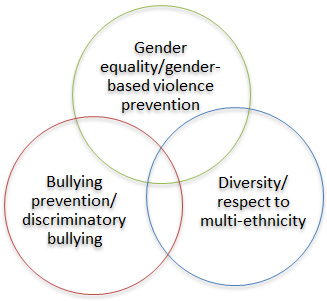yMIND in key words
disadvantaged children and youth, migrants, ethnic minorities, multi-ethnicity, gender equality, prevention
of bullying and violence, diversity, inclusion,
innovative education
disadvantaged children and youth, migrants, ethnic minorities, multi-ethnicity, gender equality, prevention
of bullying and violence, diversity, inclusion,
innovative education
yMIND is a participatory innovative project that promotes better social inclusion of newly-arrived migrant and Roma children and youth through comprehensive diversity education in school and community-based settings. The project is implemented over two years, starting from December 2016 with the support of the Erasmus + programme of the European Union (Initiatives for policy innovation – Social inclusion through education, training and youth – EACEA 05/2016)
Children and young people (CYP) - with major focus on these coming from migrant (incl. refugees) and Roma communities.
We offer:
participatory workshops enhancing their social and diversity competence,
community outreach
peer education interventions.
Teachers, pedagogues, social, youth, community and migration workers – engaged in education in both formal and non-formal learning settings
We offer:
Transfer of method competence, which will strengthen their capacity to conduct prevention and education work with children using participatory and child-centred methods.
Increase of competence to address themes such as diversity-sensitive education, gender roles, stereotypes and inequality, prevention of bullying, discrimination and violence
Guidance in implementing non-traditional learning methods and whole-school approach.
The general objective of yMIND is to strengthen capacity of educational professionals, youth and community workers for:
implementation of diversity education for better social inclusion of disadvantaged young learners through:
upscaling of two good- practice models in formal and non-formal education settings in four EU Member States : Austria, Bulgaria, Germany and Greece
To achieve the yMIND partners will adapt and test two good-practice training models interlinking three core themes into a more holistic education model:
(1) understanding diversity, respecting differences , incl. those related to multi-ethnicity,
(2) promoting gender equality and prevention of gender-based violence (GBV), and
(3) prevention of bullying and discrimination.

The clue to a successful integration of these three overlapping themes into a comprehensive model lies in a cross-cutting approach, we are devoted to: child-centred participatory approach!
Our core aim is to support schools’ culture to open (further) towards multi-ethnicity, to build cohesive inclusive learning environments, to promote acceptance and respect towards differences. Our guiding notion is that empowering participatory involvement, whole-school approaches, and close cooperation among schools and grass-root communities can help to tackle the challenges of growingly diverse European education systems.
As a final result of implementation and taking to scale such a training approach we hope to succeed in increasing the willingness of children and young people to speak and act and thus to have a stronger say in what happens to them in school and other education settings
For the concrete results to be produced by the project consult section Products.